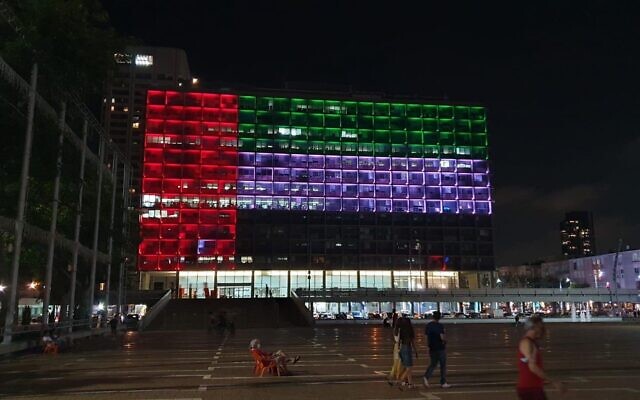FRESH AIR
What’s different about the UAE-Israel normalisation agreement?
August 19, 2020 | Sharyn Mittelman

- The deal has rewritten the rules of “peacemaking” in the Middle East and reflects a new alignment taking place
This historic agreement between Israel and the United Arab Emirates (UAE) to “normalise” diplomatic relations, differs from peace agreements Israel has achieved with Egypt (1979) and Jordan (1994) for a number of reasons. Israel was once at war with both Egypt and Jordan, and shares a border with them. The UAE has never had diplomatic relations with Israel, but has never engaged in active combat with the Jewish state either. Nor are there any active border disputes to resolve, as there were with both Egypt and Jordan.
Moreover, diplomatic relations with Egypt and Jordan have largely been “cold”, focused on security issues with only very limited economic exchange, tourism, investment, or people to people contact. Normalisation generally occurred only at a formal level. The UAE normalisation deal appears likely to be much warmer – potentially including all of these things.
Meanwhile, hope has been expressed both in Washington and Jerusalem that other like-minded nations including Bahrain, Oman, Morocco, Sudan and even Saudi Arabia may soon follow the UAE’s example. This is because the agreement reflects a broader geopolitical realignment – an already existing covert alliance of Israel, the US and Sunni Gulf nations against the threat represented by Iran and its proxies and allies – in particular its nuclear program as well as its destabilising activities across the region, from Yemen, to Iraq, Syria, Lebanon, Afghanistan and beyond.
- The UAE deal appears to have decoupled the Israeli-Palestinian conflict from Israel’s relations with its Arab neighbours
The announcement has infuriated the Palestinian Authority, despite the UAE deal requiring that Israel suspend its plans to apply its sovereignty to parts of the West Bank as part of the Trump Administration’s peace plan. However, many Gulf nations appear to have become less interested in the Palestinian issue over recent years, and the UAE deal signifies that resistance to “normalisation with Israel” out of solidarity with the Palestinians is no longer the barrier to open ties it once was.
As the UAE’s Minister of State for Foreign Affairs Anwar Gargash told Israelis in a television interview on August 15: “Clearly, 70 years of not communicating with Israel has led us nowhere. I think we need to shift to a new method of doing things. And that method simply is: We can disagree with you in political issues, but we can work with you [on] nonpolitical issues.” In other words, other interests and relations are no longer hostage to meeting Palestinian demands, even though the UAE will continue to push for progress on the Palestinian front.
Tellingly, Palestinian Authority negotiator Saeb Erekat said on August 16 that the Palestinians have called for emergency meetings of the Arab League and the Organization of Islamic Cooperation to reject the Israel-UAE deal, but have not received replies from either body.
- The deal has public support in the UAE and Israel
There appears to be a mutual “love fest” online between Israelis and Emiratis with both posting greetings in Arabic and Hebrew, and thousands of Emirati accounts following the Israeli Foreign Ministry on Twitter.
An Israeli poll conducted by Direct Polls for Channel 12 revealed that when asked whether they preferred the normalisation deal with the UAE over the promise of a West Bank “annexation”, 77% of Israelis preferred the peace agreement with the UAE, and only 16.5% favoured annexation. Even among those who identified as right-wing it was 64% in favour of the deal compared to 28% against.
Similar polls are not available for the citizens of the UAE, but so far there is little sign of public opposition there – which contrasts with what happened in Egypt and Jordan following their peace treaties with Israel.
- Business deals are already taking place between the UAE and Israel.
A deal has already been signed between Israel’s Tera Group and the UAE’s APEX investment fund on joint research into COVID-19 treatments, an agreement which must have been in the works for some time.
In fact, according to the Manufacturers Association of Israel, about 200 Israeli companies are already exporting products to the UAE, using conduit companies and subsidiaries in third countries to do so.
Moreover, a prominent Emirati businessman Khalaf Ahmad Al Habtoor told Israel’s Channel 13 on August 16 that he was already in talks with Israeli airline Israir on establishing direct flights between Israel and the UAE, praising the normalisation deal as a “great” opportunity for both nations.
Israel’s Prime Minister Netanyahu appeared on Abu Dhabi-based Sky News Arabia and said that Israel plans to import from “free zones” in the UAE — areas where foreign companies can operate under light regulation and where foreign investors are allowed to take full ownership in companies.
Israel’s Economy Ministry estimates that the normalisation could lead to Israeli exports to the UAE reaching an annual US$300-$500 million, while UAE investments in Israel may be around US$350 million a year.
Tags: Israel, Middle East, peace, UAE
RELATED ARTICLES

‘Optimism’ for Hamas to ‘exile’ their power and create a permanent ceasefire with Israel: Joel Burnie on Sky News

Australian government’s response to Iran-Israel conflict ‘disappointing’: Paul Rubenstein on Sky News

UNRWA feeds the ‘Palestinian delusion’ of no Jewish state: Dr Einat Wilf on Sky News




















